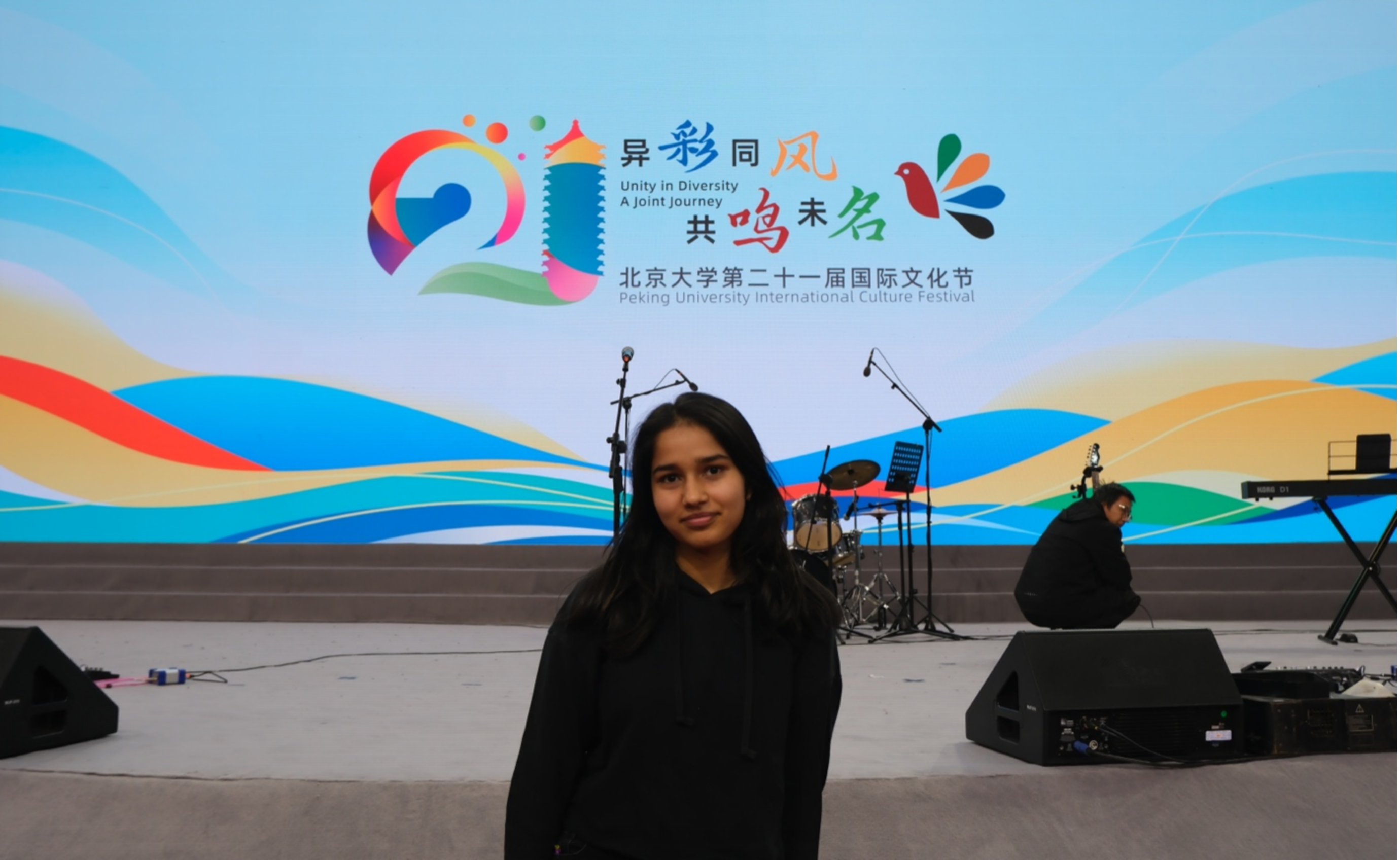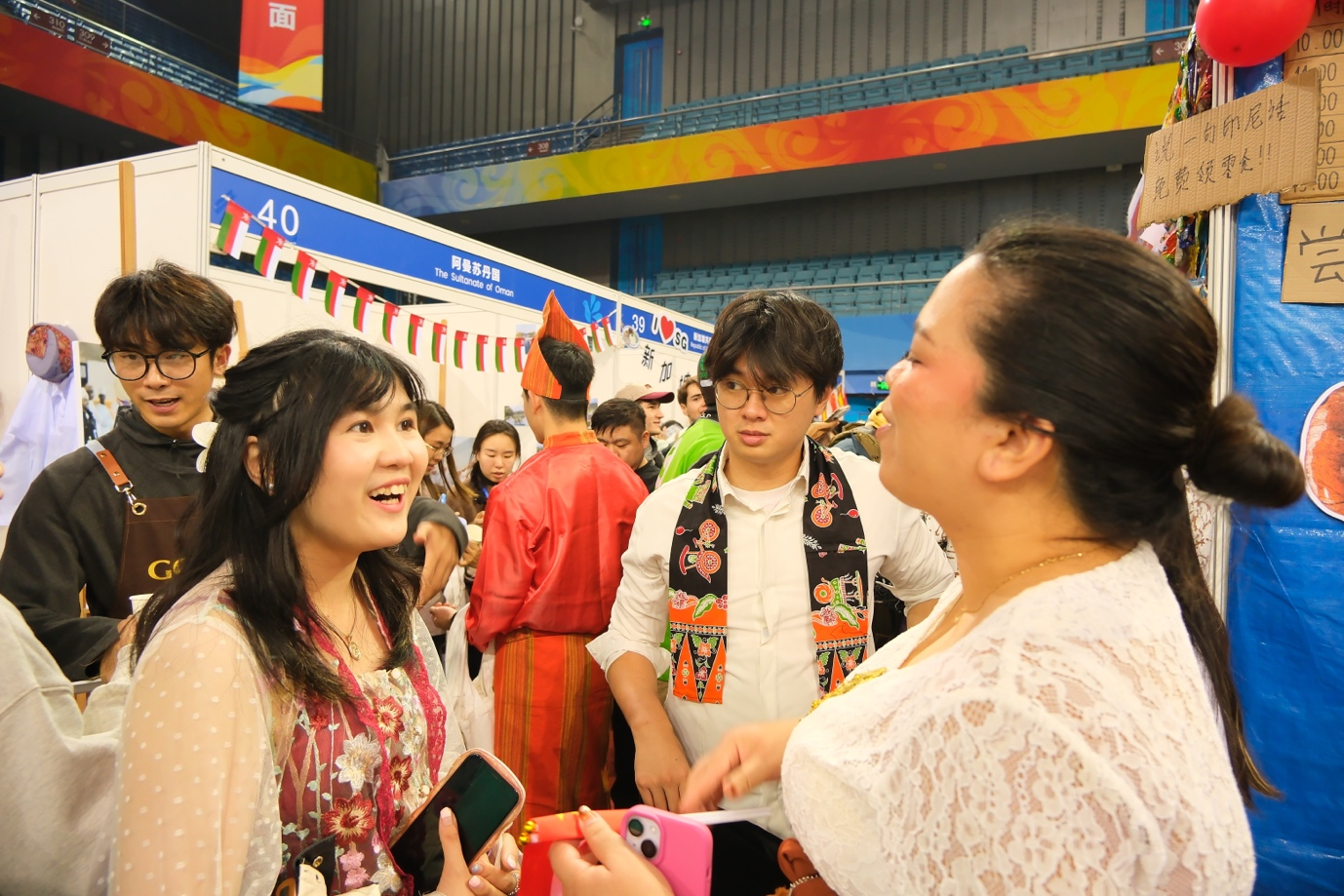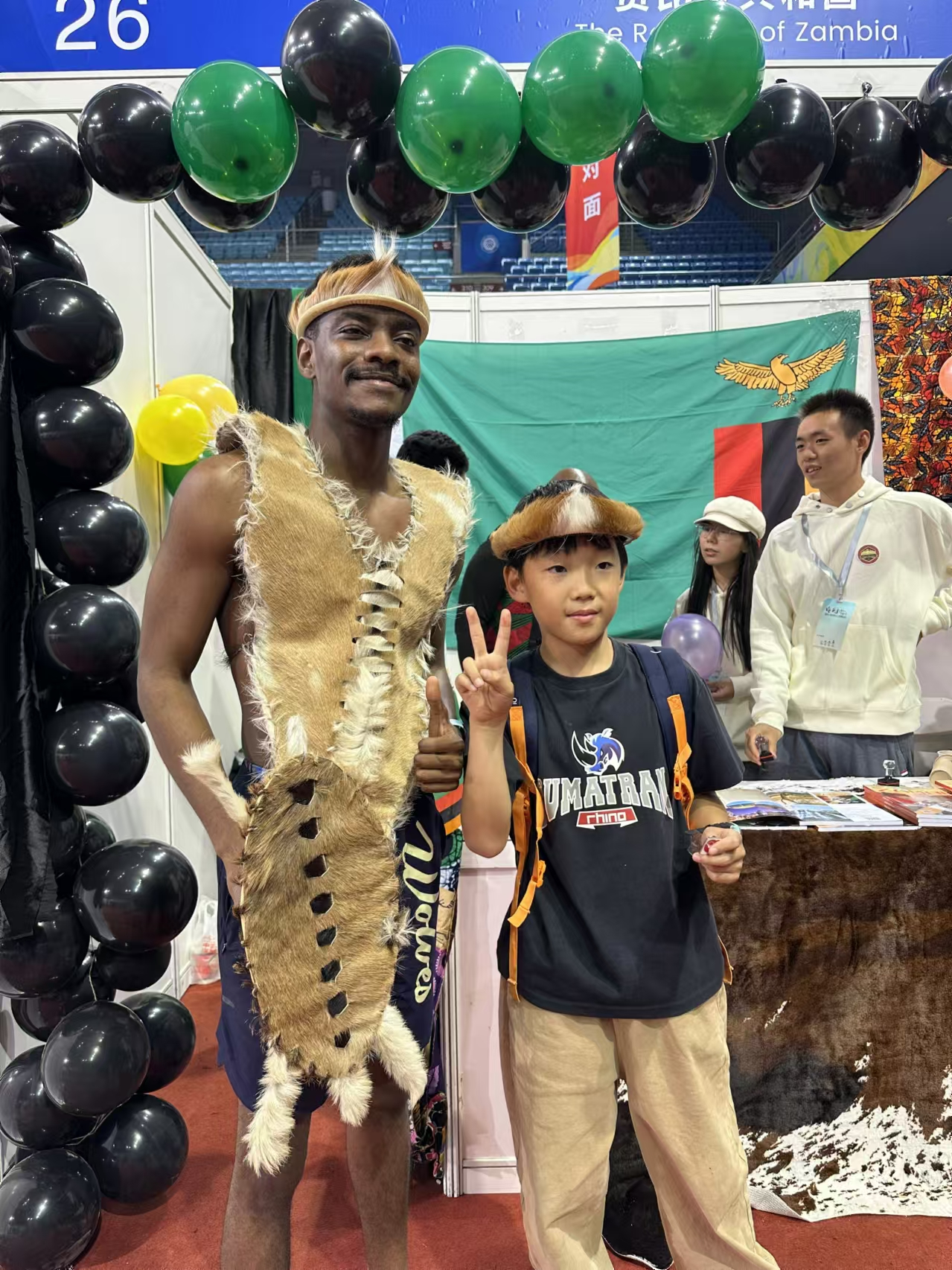Peking University, November 20, 2024: During this year’s International Cultural Festival (ICF), our reporters visited various booths to explore and celebrate the diverse cultures represented at Peking University (PKU). From savouring delicious traditional delicacies, to popular tourist destinations, five international students share with us their experiences in China, and give insights into their own cultures.
Samana Adhikari: Celebrating Diversity in My World
Samana Adhikari from Nepal is a second-year student at the School of Psychological and Cognitive Sciences. She shared that in Nepal, there are two main holidays—Dashain and Tihar. During Dashain, families gather to receive blessings from the older generation, enjoying quality time with extended family members. Tihar is a festival where they worship various gods and animals on different days, with one of the most important days dedicated to celebrating sibling relationships.
 Samana at ICF
Samana at ICF
Samana’s favorite traditional dish is Dal Bhat Tarkari, a rice dish paired with lentil soup and vegetables, as well as steamed dumplings called Momo, often filled with vegetables, chicken, paneer, mutton, or buffalo meat. Momo is of Tibetan origin, but in Nepal, there is an interesting twist to it—the dumplings are eaten with chili and tomato sauces.
As a multi-ethnic society, Nepal is full of diversity and has elements of different cultures, which is what makes the country unique. “Keep an open mind,” said Samana, when asked about her advice for those interested in learning more about her culture. Although Nepal has cultural similarities with China and India, one could focus on the differences between Nepal and other countries. Samana also candidly shared that her culture has shaped her in a way where she has different personalities based on the language she speaks—Nepali, Chinese, English, and Hindi.
Lamin K Saidy: Showcasing Gambia’s Allure
If you happened to visit The Gambia’s booth at the ICF you might be surprised to learn that this cozy and vibrant space, filled with rich West African cultural elements and handicrafts, was put together by just one person. That person is Lamin K Saidy, the only student from The Gambia studying at PKU in 2024.
At 29, Lamin exudes an easygoing and lively energy, especially when he talks about his home country. When asked what best represents The Gambia, he did not hesitate to introduce the Kora. This traditional African instrument, integral to his childhood, continues to be a comforting sound for him whenever he is away from home. Although putting together a booth alone was tiring, Lamin’s determination to introduce The Gambia to the world, as well as the support from event organizers and volunteers kept him going.
Lamin at ICF
Having completed his undergraduate studies in Harbin, Lamin’s connection with China runs deep. Fascinated by Chinese culture and history, he chose to return for his Masters to study Public Policy at PKU. Although adjusting to China’s weather took some time, he quickly settled in with the help of his mentors and friends. Lamin also expressed his love for the wide variety of cuisine in China.
“I have learned many Chinese values, like discipline and respect,” he shared. “I was deeply impressed by how everyone complied with restrictions during the COVID-19 pandemic.”
After spending nearly three months at PKU, Lamin feels more at home than ever. For him, being surrounded by students from many different countries and cultural backgrounds is a rare opportunity, helping him build his confidence and expand his horizons.
Upon graduation, Lamin hopes to return to The Gambia and start his own consultancy firm, focusing on e-commerce. With The Gambia’s tourism industry growing steadily in recent years, he warmly invites everyone to experience the beauty of his homeland along the Atlantic coast by touring the country.
Nicole Accalia Angriawan: Hospitality Brings us Together
Hailing from Indonesia, Nicole Accalia Angriawan is a first-year Masters student at Yenching Academy. One of the traditional festivals celebrated in her country is Eid Mubarak, where people celebrate the end of fasting. During this time, people return to their hometowns for a holiday, similar to the Spring Festival in China.
 Nicole (left) at the Indonesian booth
Nicole (left) at the Indonesian booth
When asked about her favorite food, she mentions Satay, a dish where meat is grilled using coal for a smoky flavor. Satay is often dipped in a peanut sauce that has sweet soy sauce added to it. “As for my personal favorite, it is the food that my mum makes, called Sambal Ati,” Nicole playfully added. This savory dish is a mixture of chicken heart and other internal organs of the chicken, added with potatoes and carrots. The dish is first fried before being boiled with coconut milk.
Indonesians are known for their hospitality, as they are always friendly and smiley towards everyone, regardless of nationality. Nicole talks about how people in Indonesia are always welcoming towards foreigners and would not hesitate to lend them a helping hand, with most even willing to speak English.
In her opinion, understanding Bahasa Indonesia is one way to learn more about her culture. The language is not difficult as it uses Latin alphabets and is an applied language, with words coming from other countries such as Portuguese and Dutch. She also encourages one to look for things they are interested in to better understand a culture, for instance exploring nature places in Indonesia if one enjoys traveling.
Kenias Tembo: Zambia to the World
Kenias Tembo is a fifth-year medical student at Peking University Health Sciences Center. He has a vibrant mission: to let people experience “Zambia within China” and to showcase the real Africa. “Zambia has over 72 ethnic groups,” he explains, proudly representing his heritage by wearing the traditional attire of his Ngoni tribe from Eastern Zambia. Historically worn by warriors, this attire now makes an appearance at celebrations, especially during Nc’wala, known as the biggest traditional ceremony in the world.
 Kenias (left) in traditional attire
Kenias (left) in traditional attire
When asked about recommendations to understand more about Zambia, Kenias has plenty of suggestions. For an authentic taste of Zambia, he suggests trying nshima, a nutritious maize-flour porridge that’s a staple in Zambian cuisine. For travel, Livingstone is at the top of his list. The city is home to Victoria Falls, one of the Seven Natural Wonders of the World. Kenias also recommends a walking safari, as it offers a unique opportunity to observe Zambia’s wildlife up close. After all, Zambia is renowned for having all the Big Five animals: elephants, buffalos, lions, leopards, and rhinos.
Kenias says that his experiences in both Zambia and China have shaped him profoundly. “Our ancestors went through so much, so Zambians have a humble outlook towards life,” he shared. “Regardless of what I have, what I don't have, I always have a humble approach to everything.”
In closing, Kenias encourages everyone to see Africa with fresh eyes. “Disregard any misconceptions you’ve heard—experience Africa for yourself.” And with a smile, he adds, “Zambia ku chalo! Zambia to the world!”
In conclusion, the International Cultural Festival (ICF) 2024 at Peking University highlighted the unique beauty and diversity of global cultures through the voices and personal stories of international students. These participants, each proudly representing their heritage, shared not only traditional food, clothing, and customs but also the values that define their homelands.
Written by: Rachel Lee, Mikal Filipos Weldeyohanes, Huang Junheng
Edited by: Wang Mengjiao, Phoon Hui Yin, Andrena
Photos from: Dingdan, Pralhad Gupta
 Samana at ICF
Samana at ICF

 Nicole (left) at the Indonesian booth
Nicole (left) at the Indonesian booth
 Kenias (left) in traditional attire
Kenias (left) in traditional attire